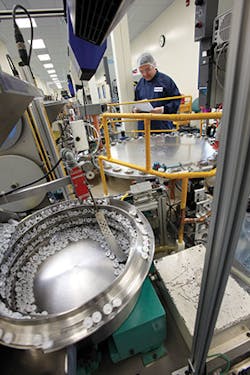2014 IW 1000: Jabil Circuit -- The Manufacturer's Manufacturer
"Manufacturing is what we do. We build stuff. We take a lot of pride in that and we're pretty good at it."
What Jabil Circuit (IW 1000/254) CEO Mark Mondello doesn't say, but perhaps should, is that you have to be good to survive in the manufacturing territory his company occupies.
Jabil Circuit (the name comes from founders Bill Morean and James Golden) began as an electronics assembly repair shop in Detroit in 1966. Today, the contract manufacturer has annual revenues of more than $18 billion, operates in 22 countries and works for some of the most prominent and demanding companies in the world. The client roster includes Apple, GE, Johnson & Johnson, Cisco, Siemens and HP.
Twenty years ago, contract manufacturing largely involved taking blueprints and instructions from a customer and making the requested product. While some of that still goes on, says Mondello, 50, most of Jabil Circuit's relationships with customers "are quite deep, quite strategic, long-term relationships."
Those strategic relationships involve a good deal more than purely assembly work, he says.
"When I think about manufacturing, it is not only the process of putting the products together but engineering, design work, the solutioning and designing of the supply chain, the logistics, the lowest landed costs as far as distribution, the sophisticated IT systems that are behind a lot of what we do, and then procurement and innovation," says Mondello. "Manufacturing, the actual putting together of the parts, is only a portion of what we do."
Working with product titans such as Apple requires the scale necessary to take on such demanding projects as manufacturing millions of iPhone cases. Jabil, headquartered in St. Petersburg, Fla., operates at 90 sites around the world with 40 million square feet of manufacturing space. The company ships $50 million to $60 million worth of products every day. More than 175,000 people work for Jabil.
Diversification
Moving at Lightning Speed
If there is one thing Mondello can count on in running Jabil, it is change. As a contract manufacturer, the company must be prepared to take on major new projects in a few months, with all the attendant supply chain and tooling challenges they present.
"The rate of change in the world today, and particularly in the industries we serve, is moving at an unbelievable pace," he noted. "Speed is important to us.”
Mondello says the ability to keep Jabil's far-flung operations focused on the company's goals and moving in the same direction starts with organizational structure and leadership. He said he keeps a close eye on the needs of the business and when "tweaks" are required to better serve its markets.
Sometimes, that can result in moving out of a market, as Jabil did in 2013 when it divested its aftermarket services business. The company saw the repair business as outside its core manufacturing focus and sold it to iQor for $725 million.
To meet the needs of customers whose world is "moving at lightning speed," Jabil follows a decentralized management structure. Mondello says Jabil tries to put as many resources as close to clients as possible. Employees need to "spend the vast majority of their day focused serving the customers," Mondello said.
In such decentralized organizations, employees must be trusted to make decisions in the best interests of the company and its customers.
"We rarely if ever get upset with people making mistakes," said Mondello. "If we're not making mistakes, we're not pushing hard enough for innovative solutions for customers."
At the same time it practices decentralized decisionmaking, Mondello emphasizes, Jabil has established centralized systems and resources to ensure that the company shares best practices and has clarity in its far-flung operations.
"We have many broad-based innovative capabilities in the company, and we intentionally keep those in a centralized depository, if you will, so that all of our different commercial leaders and business folks have access as they see fit for their respective value offerings," he explains.
Technology plays a critical role in managing this diverse company. Jabil uses a single ERP system throughout its operations, which Mondello says provides a critical competitive advantage. "Delivering really high-quality product in a very noisy, complicated marketplace and doing that with lots of flexibility is where the technology comes into play," he says.
Jabil's centralized "capabilities group" is charged in part with implementing advanced automation and robotics across the company.
"We have always been a company that leveraged automation. I think that is accelerating and will continue to accelerate for a number of years," said Mondello.
Jabil is using 3D printing in its engineering labs and for certain low-volume production situations. But in the future, says Mondello, "The opportunity is two-pronged. One area is leveraging the 3D technology inside the company to better serve our markets and our customers. The other is partnering with certain technology companies in actually building the 3D printers."
Jabil also has instilled lean manufacturing processes into its operations. In 2013, for example, the company conducted more than 71,000 kaizen events. Mondello said lean was "very important" to the long-term success of the company.
"It is a mindset," said Mondello, adding that it is all about "being able to see, identify and eliminate waste on a continuous basis." He noted that lean practices don't reside only on the manufacturing floor. They are used in Jabil's supply chain, finance, human resources and other functions. He said the company also works to instill lean practices into its supply chain.
CEO as Servant
Mondello was no stranger to Jabil when he became CEO in March 2013. A mechanical engineer by training, he joined Jabil in 1992 as a manufacturing supervisor and rose through the ranks to become COO in 2002. While much of the CEO job is similar to his work as COO, he points out: "There is no confusion that the role of CEO is ultimate accountability. I knew that coming in, but you get it hitting you head-on all the time."
While some CEOs are known for sucking the air out of any room they enter, Mondello goes out of his way to praise his management team and the company's employees. Not surprisingly, then, he sees his leadership job as "absolutely a servant role."
"It is all about the people around me. I am fortunate to have a wonderful team."
If you wear a perpetually long face, however, it might be best to keep your distance from Jabil's CEO.
"Negative energy is my kryptonite," he said, "so I surround myself with positive attitudes. There are more than enough problems to go around."
About the Author
Steve Minter
Steve Minter, Executive Editor
Focus: Leadership, Global Economy, Energy
Call: 216-931-9281
Follow on Twitter: @SgMinterIW
An award-winning editor, Executive Editor Steve Minter covers leadership, global economic and trade issues and energy, tackling subject matter ranging from CEO profiles and leadership theories to economic trends and energy policy. As well, he supervises content development for editorial products including the magazine, IndustryWeek.com, research and information products, and conferences.
Before joining the IW staff, Steve was publisher and editorial director of Penton Media’s EHS Today, where he was instrumental in the development of the Champions of Safety and America’s Safest Companies recognition programs.
Steve received his B.A. in English from Oberlin College. He is married and has two adult children.


